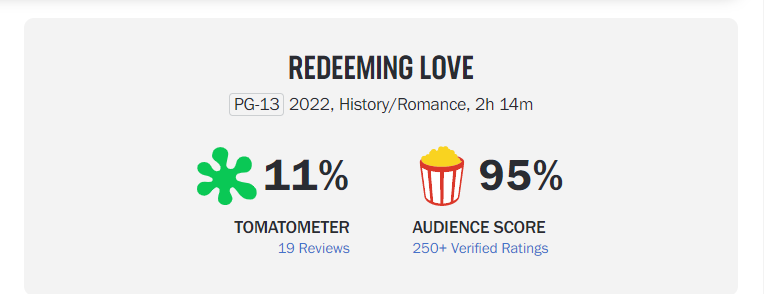
Redeeming Love Misses the Mark
Hello everyone! It’s been a while since I posted and for that, I apologize. We’ve had a lot of big life changes and moves in the past year and it’s meant not as much time for writing here as I would like. At some point I do hope to catch up and get into a more regular posting pattern again.
But let’s talk about what brought me back. It can be a luxury sometimes to not have an opinion on something. It’s a relief to be able to just put your head down and do your work and ignore some things. I think in recent weeks and months, we’d all be much happier if more people did this.
Sometimes we aren’t afforded that luxury and we are required to say something. Even when we don’t want to. Anyone who has heard the nudge or voice of the Lord telling them to do something they really don’t want to will understand that. That’s where I am at the moment.
Let me start with this. I don’t like to criticize movies. I did for a while early on before I was working full time in the industry. But making movies is hard. Each one that you see anywhere is its own miracle that it ever got produced because it takes so many people and so much work. When you see things like that, it gives you a little more grace for the artists and the people involved. That said, I have come here today to share some thoughts about a movie currently in theaters, Redeeming Love. My hopes here are to share some of my thoughts and then provide sort of a clearing house of links for people to do their own research on the film.
First a little about the film
Here is the synopsis from the official website:
Based on the bestselling novel by Francine Rivers, REDEEMING LOVE is a powerful story of relentless love and perseverance as a young couple’s relationship clashes with the harsh realities of the California Gold Rush of 1850. It is a life- changing story of the power of unconditional and all-consuming love. Playing in theaters now, REDEEMING LOVE shows there is no brokenness that love can’t heal.

The Controversy
For years people have complained that faith films have a tendency to ‘sanitize’ stories and try to make faith films equal family friendly. With Redeeming Love, they took an opposite approach. Because of the subject matter and the fact that the team wanted to appeal to a mainstream audience, Redeeming Love chose to go the opposite of watering down or sanitizing. They put every bit of ugliness from prostitution and abuse of the 1850s up onto the screen. Now let me say that I deeply admire people trying to show reality because, as much as I joke about life being a sitcom, we all know how ugly it can be. As believers, it can be tough to navigate those daily choices and sometimes seeing your reality on the screen can help. In cases like this, it can also educate on hard topics like abortion, violence, or in this case, prostitution, human slavery, and trafficking. However, I feel the efforts here were misplaced and mishandled for how the story unfolded.
There are ways, from a story perspective, that this film didn’t need to go into graphic and detailed sex to get a point across. The movie Room is a good example of this.

Room (starring Brie Larson and based on the book of the same name) is about a young woman who was kidnapped and sexually assaultedfor years. The book and film are both brutal, honest, and raw but the way they put it on the screen means the audience didn’t have to watch the assault happen. They didn’t need to have it placed in front of them to have the full horror of the assaults set the tone. And they also didn’t sexualize the actress in their telling/showing of those scenes. In Room, we carry her trauma…not her sexualization. That’s a big difference.
For Redeeming Love, consider the fact that several actors were asked to be naked, simulate sex and even orgasms on camera. That’s where the bulk of my concern lies. I don’t believe a faith film should ask a young woman to be naked on set in front of men who are not her husband. It also required a young man to simulate sex with a woman he didn’t know before this production.
Some are saying “The scenes were so beautifully shot and it was a husband and wife so it was okay!” But they aren’t husband and wife. They are actors being asked to do something to tell a story. And even on a closed set, there had to be camera ops, audio techs, lighting techs… It’s a pretty decent guess that at least some of those people were men and that they saw this young woman naked and simulating sex and orgasm for an audience. If there are four minutes of sex in this movie (as noted by Focus on the Family’s Plugged In review) it’s entirely possible that those four minutes came from hours of footage of the sex act that were left on the editing room floor. That means you don’t see it, but someone had to sit through everything that you didn’t see in order to choose the best angle, lighting, etc.
Even before filming, all those things had to be choreographed. Rehearsed. Set for lighting and sound and props. Perhaps repeatedly. That’s a lot of time, thought, and focus on sex. To get a two second shot of his hands covering her breasts could possibly mean an hour or more of setting, placement, lighting with his hands on her in that manner.
It’s been well documented over the years how difficult that scenes with nudity and sex can be for actors to film. In fact, Emma Thompson (a favorite of mine) just released an interview about doing the first full frontal nudity of her career at 62. She notes in this interview how challenging, difficult, and time consuming it can be to do nude scenes, let alone simulate the act of sex on camera.
I am bothered that a faith film with a direct link to a story from the Bible would ask young actors to be naked in front of each other and intimate on camera. I don’t believe that was necessary for the story to be told or understood. There’s a whole other set of layers to the idea of this young actress, whom many are connecting with faith films, has now been naked and sexualized for other faith films. I am aware that she wasn’t naked on the screen. However, the camera angles and specific shot choices mean that she had to be at least partially, if not completely naked for many of the takes. And this would have been in front of men working on the set. As believers, I do think we need to conduct ourselves differently and I’m not sure these were the right choices.
I have worked on films that included nudity. But the movies I was called to work on were not claiming to be faith films or trying to reach an audience with God’s word or message. I can’t hold them to those same kind of standards. God called me to work on those films for other reasons, which became clear later and I am happy to share those if anyone is actually interested.
Redeeming Love Missed the Mark
It’s been made plain that the creators behind Redeeming Love wanted to reach a mainstream audience with the gospel. Here’s an interview about that target audience and goal.
If reaching the unsaved was indeed the goal, they missed the mark. This is proven by the mainstream critics all scratching their head to understand how a film packed with sex, violence, abortion, and pedophilia is seen by Christians as a romance. Rotten Tomatoes lists the difference between audience scores and critic scores.

This showcases an epic divide between audience and critics. The audience scores are mostly comprised of fans of Rivers book. There’s nothing wrong with that. I’m a huge fan of her writing. We have all of her books and for this one? We have six copies in my home. I know this book cover to cover very well. So I get it. But something has obviously been lost in translation if the very people that the teams had hoped to reach (the unsaved) with this story are basically scratching their heads about what they’ve watched.

For contrast, Moulin Rouge is one of my favorite films of all time. I absolutely adore it. I can quote it forward and backward and a few years ago, I actually wrote a Bible study depicting various scenes where it felt like the story mirrored that of Hosea and Gomer. That film, put together by no one attempting a story of Hosea or Gomer or trying to spread the gospel, (it even has an evil duke! And music too!) turned out to be cleaner and more respectful of the sex act and the m en and women than this one. They are set in a similar time frame, setting…everything. But vary widely in the way they approached the story.
One of my daughters pointed to a poster of Moulin Rouge that we have on the wall and asked how two films that were so similar could have gone so differently. My other daughter said, “It’s easy. One concentrated on love. The other one concentrated on sex.” She’s not wrong.
Please look at Common Sense Media’s reviews of both films and see what both parents AND kids are saying about the movies.
https://www.commonsensemedia.org/movie-reviews/redeeming-love/user-reviews/adult
https://www.commonsensemedia.org/movie-reviews/moulin-rouge
If you were looking at just the reviews and comments made about each film, you’d have to wonder which is the faith film and which is the mainstream film and as a believer who works in this industry, I find that troubling.
So that’s where I am going to leave this. I do have some thoughts on the other angles of the film like script, marketing, theatrical distribution and a few other aspects, but this was my biggest concern. I’m not sure that this film gives the message that was intended. I know it’s meeting some people where they are, but most of those seem to be women who read the book. My thoughts are that if someone goes into this film without ever having read the book or Hosea, they shouldn’t come out confused about how it’s a romance. My prayer is that some are redeemed from this film, but I am concerned it may have caused more harm in circles than good.
If anyone would like to discuss this or the other aspects, I’m up for polite discourse and discussion. I may be missing parts or viewpoints and would love to understand better. But please, stay respectful. No bullying or shaming or throwing insults around. Let’s just come and reason together so we can all do better next time around.




